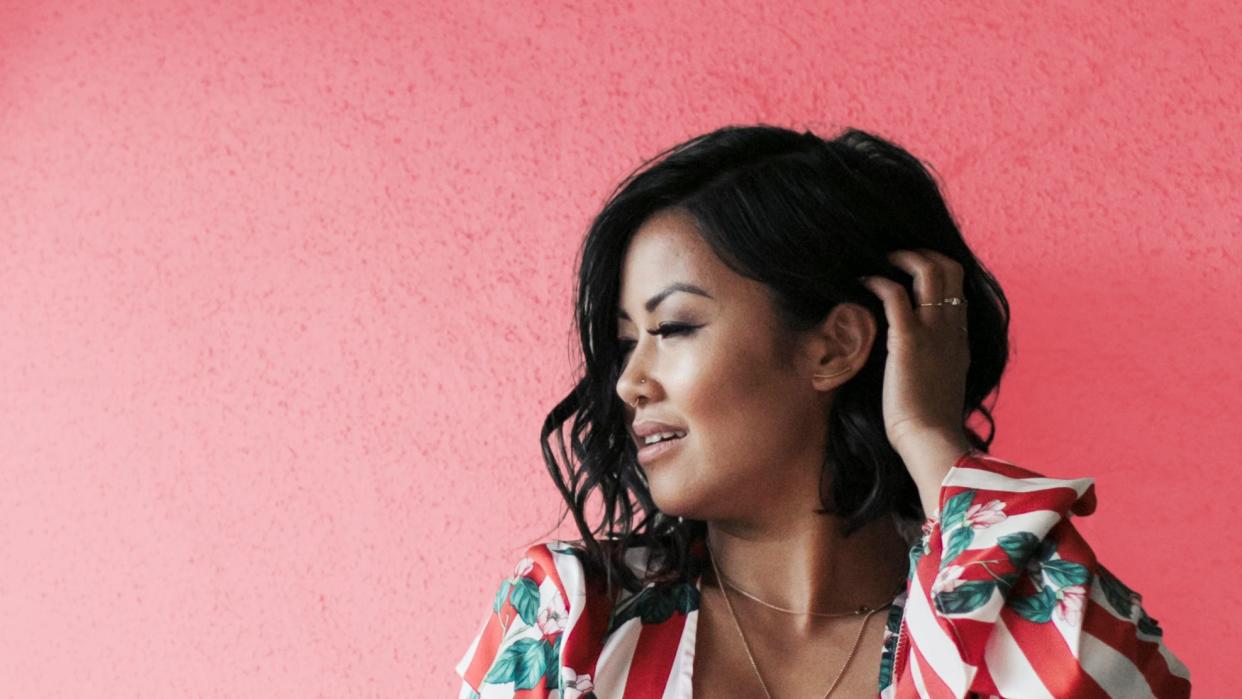As an Asian American, I'm Giving Myself Permission to Speak Up

Tonhya Kae Photography / @tonhyakae
As a first-generation Asian American woman and a self-proclaimed queen of messy conversations (you know, those difficult ones most people avoid but really need to have), I feel compelled to speak up at this incredibly challenging and painful time. Working as a relationship and women's life coach has opened my eyes to just how much internalized pain so many of us in the Asian Americans and Pacific Islanders (AAPI) community struggle with. And while my work is often focused on healing the pain and trauma of sexual abuse — something I've dealt with personally — I am acutely aware of how the same methods I use with my clients can be applied to processing and mending the immense agony many of us in the Asian American community are feeling in the wake of so much racism, violence, and murder.
My work is rooted in the belief that pain, trauma, and emotional wounds reside in our physical bodies. But when we're able to transform those things through pleasure, love, and unconditional and radical self-acceptance, we become whole, integrated humans and whole integrated women, which turns us into beautiful leaders. I've seen and experienced this in the realm of sexual healing, but also in the context of intergenerational trauma, something that is coming to the surface for so many people right now, especially Asian women.
There are different definitions of intergenerational trauma, but here is what most resonates with me: It's trauma that lives in the ancestral lineage and gets carried on from one generation to the next. This trauma is often built on the unconscious patterns that keep us repeating the same mistakes and causing the same wounds as our parents, simply from watching them enact those patterns themselves or from witnessing their pain from those inherited wounds. That trauma is then programmed into us as decedents because we absorb it through our senses. We see it, we feel it, and it imprints into our bodies.
When we're able to transform [trauma] through pleasure, love, and unconditional and radical self-acceptance, we become whole, integrated humans and whole integrated women, which turns us into beautiful leaders.
I've known about intergenerational trauma for years, but the recent surge in anti-Asian violence and the recent murders of eight people in Atlanta — six of whom were women of Asian descent — have provoked old and new suffering to surface. Frankly, it's brought up a lot of physical pain for me, and I sense it's affected others in the AAPI community the same way. It's caused me to remember some of the hateful, racist things that were said to me when I was growing up. The women murdered in Atlanta could have been my friends, my aunts, my cousins, my mom — they could have been me. And if you, like me, are someone who's experienced any sort of violence onto your body or in your environment, seeing something like these brutal killings happen to people who look like you makes you feel that you are therefore also susceptible to that same violence. It's terrifying, it's sobering, and it's quite literally painful — mentally and physically.
Asian American women have largely been conditioned to remain silent, both to uphold cultural norms in the home and to avoid rocking the boat out in the world.
Compounding all this hurt is the fact that Asian women specifically are stereotyped as submissive, docile, quiet, and subservient. That's not only how we're often perceived in Western culture, but it's how many of us are taught to behave in our families. We're told we shouldn't rock the boat or draw attention to ourselves. Many of our parents and grandparents came here as immigrants — speaking up against authority wasn't an option for fear of being swiftly removed from their new home. So that messaging was passed down and reinforced, both consciously and unconsciously — through direct and overt messages and subliminal, subtle behaviors and looming threats. For generations, we have been told to fit in so we don't get in trouble and to be the model minorities and perform as well and work as hard as humanly possible because that's how we live out the American Dream that our families fought so hard for. Asian American women have largely been conditioned to remain silent, both to uphold cultural norms in the home and to avoid rocking the boat out in the world.
I understand where those principles originated for our ancestors, which were informed by the anxieties inherent in the immigrant experience and strict, centuries-old gender roles. But the reality is that today, those same ideals are limiting. The status quo of remaining quietly in the background is preventing us from feeling empowered to do something as our community is gruesomely attacked and murdered.

Tonhya Kae Photography / @tonhyakae
So how do we move forward as a society? And how do Asian American women specifically begin the healing process? There is no single answer, but what I've found in my personal and professional experience is that the real change is found in the work that you avoid. Facing certain things head-on is the only way to change them. If that sounds like a massive, mind-bogglingly difficult undertaking, that's because it is. But it's worth the effort and is essential to letting our embodied, intergenerational wounds breathe, scab over, and ultimately heal.
Ready to tackle the really hard stuff? Here are some practical, tangible ways I encourage Asian American women to initiate their own healing process right now:
Talk about it. This is easier said than done, but I'm encouraging you to speak up, even if you fear it will bring shame to your family. Begin by having conversations with your inner circle. You can also seek out safe spaces online or on social media (check out The Cosmos, an online haven for Asian women) where you can have an open dialogue with others in the AAPI community and gain support in sharing your experiences. I understand how impossible this might feel, but suppressing your pain will cause shame and resentment to brew within yourself. Begin to change the narrative in your mind and tell yourself the reason you're speaking up is for your family — it's to be able to change things. We absolutely need to honor ourselves if we want to repair the wounds of our past and present and improve our future.
Give yourself permission to rest. I decided earlier this year that my mantra for 2021 is "permission granted." I want to encourage Asian women specifically right now to grant themselves permission to acknowledge their own pain and to let go of the ingrained messaging that we should silently and stoically maneuver through it — even if it kills us. No — we need to rest, too. Oftentimes, our cultural messaging has reinforced the myth that rest is unacceptable or even lazy. We must change that narrative and take time out, whether that means logging off of social media to avoid doomscrolling or being retraumatized by media reports or content from other users, or requesting time off from work to decompress. (Related: Your Guilt-Free Guide to Taking a Mental Health Day)
Cultivate a practice of pleasure and joy. Tuning out the noise from heartbreaking headlines with distractions can be positive and healthy, but I want you to take it a step further — to truly embody the feeling and experience of overwhelming joy. That might mean dancing around or finding a way to play with your inner child. Sleep if you can. Wear something nice that feels good on your body — get out of your sweats, put on something silky and delicious, use your perfumes. Adorn yourself with shit that makes you feel like a sovereign queen right now.

Tonhya Kae Photography / @tonhyakae
Have compassion for yourself and others. "Trauma is not what happens to you, it's what happens inside of you." This is a quote I love from trauma psychologist Dr. Gabor Maté. It's not the event or the thing that happened to your physical self — it's what's happening internally. You cannot always see external pain. Remember that as it applies to you and to your friends and family — show yourself compassion and extend that compassion to those in your community who may also be struggling, no matter how strong or composed they may appear on the outside.
Physically ground yourself. Difficult emotions may surface for you right now. Letting yourself truly feel them is important. If a strong feeling such as anger or sadness is manifesting in some kind of pain or agitation somewhere in your body, lie down, take four deep breaths (inhale for a count of four, hold for a count of four, exhale for a count of four) and focus on the sensations of being in your body rather than your thoughts or emotions. Allow yourself to feel safe. Turn on some music or begin to meditate so you can recenter. Light a candle to stimulate your olfactory sense. And most importantly, tell yourself over and over again: "You are safe. You are safe in your body. You are loved." Be present within that moment by recognizing you're safe, and imprint that by slowly and sensually touching your body. That is the easiest way to calm down your nervous system. And if you fall into deep rest, even better — allow yourself to sleep.
If you're not experiencing the trauma of these events first-hand and you're looking for ways to be an ally to your Asian American friends right now, it's important to remember that everyone is different and there is more than one way to be present for someone's pain. Still, one powerful way to show up is to ask your friends, "can I hold nonjudgmental space for you and be there to listen and validate your experience?" Also ask, "how can I support you right now?" They might not know the answer, but asking those questions can be profound because it will allow them to feel seen and safe. The best way to view this is to imagine how you'd treat a friend going through a terrible heartache or breakup. You'd want to feed them, wrap them in a blanket, and allow them to feel comforted and embraced in the bare essentials of safety.
For anyone in the APPI community reading this, if you haven't heard these words today: I see you, I hear you, I love you. You are safe and I accept you completely. Take care of yourself and each other.

